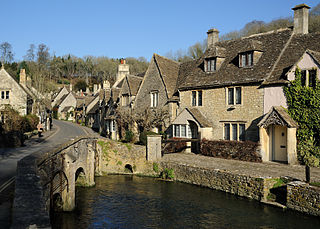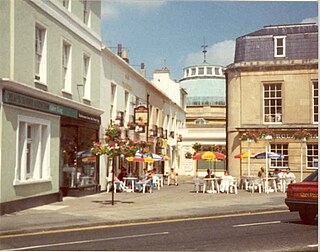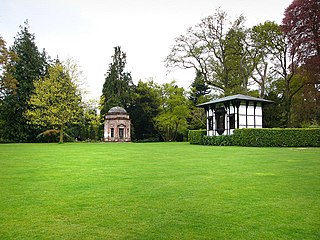
The Cotswolds is a region in central-southwest England, along a range of rolling hills that rise from the meadows of the upper Thames to an escarpment above the Severn Valley and Evesham Vale.

Cheltenham, also known as Cheltenham Spa, and sometimes called "the Garden Town of England", is a spa town and borough on the edge of the Cotswolds in the county of Gloucestershire, England. Cheltenham became known as a health and holiday spa town resort, following the discovery of mineral springs in 1716, and claims to be the most complete Regency town in Britain.

Tewkesbury is a medieval market town and civil parish in the north of Gloucestershire, England. The town grew following the construction of Tewkesbury Abbey in the twelfth century and played a significant role in the Wars of the Roses. It stands at the confluence of the River Severn and the River Avon, and thus became an important trading point, which continued as railways and, later, the M5 and M50 motorway connections were established. The town gives its name to the Borough of Tewkesbury, a local government district of Gloucestershire. The town lies on the border with Worcestershire, marked largely by the Carrant Brook.

The University of Gloucestershire is a public university based in Gloucestershire, England. It is located over three campuses, two in Cheltenham and one in Gloucester, namely Francis Close Hall, The Park, Oxstalls and The Centre for Art and Photography being near to Francis Close Hall. In March 2021 the university purchased the former Debenhams store in Gloucester City Centre, with a new campus due to open there in 2023.

Montpellier is a district of Cheltenham, Gloucestershire (England), at the end of the Promenade south of the town centre. Originally developed in the 1830s in conjunction with the spas, it is now known for its bars, cafés, restaurants and range of specialist shops. In April 2008 Montpellier was one of the most expensive areas in Cheltenham to buy property, with apartments ranging from £300,000 to over £1,000,000, townhouses from around £400,000, and houses over £4,000,000.

Wyck Rissington is a village and civil parish in the picturesque Cotswold hills of Gloucestershire, England. The village is located 1.5 miles (2.4 km) north-east of Bourton-on-the-Water. The name 'Wyck Rissington' translates from the Saxon as "A building of special significance on a hill covered with brushwood".
John B. Forbes was an architect in Cheltenham.
Wymans Brook is a district in the north-west of Cheltenham, Gloucestershire, England, named after the small river which flows through the district. It is situated relatively close to Cheltenham racecourse, Pittville Park, the Prince of Wales Stadium/ Leisure @ Cheltenham and the area of Cheltenham known as "Swindon Village".

The Pittville Pump Room was the last and largest of the spa buildings to be built in Cheltenham.
Pearson Thompson was an English solicitor and property developer who was responsible for the layout of a great part of Cheltenham, and of the Ladbroke Estate in London. He subsequently emigrated to Australia where he practiced law.

The Larmer Tree Gardens near Tollard Royal in south Wiltshire, England, were created by landowner Augustus Pitt Rivers in 1880 as pleasure grounds for "public enlightenment and entertainment". They were the first private gardens opened for public enjoyment in the United Kingdom, and were free to enter. The 11-acre (4.5 ha) Grade II* listed gardens are within the Rushmore Estate in Cranborne Chase, an ancient royal hunting ground and now an Area of Outstanding Natural Beauty.

St. Pauls is one of a number of areas of the Cotswold town of Cheltenham, Gloucestershire, England. St. Pauls is home to the Francis Close Hall, a campus of the University of Gloucestershire, St. Paul's Church, and many leisure facilities. Numerous stories exist of the gallows that were once housed there when the area was characterized by fields rather than housing.

The National Star College is an independent specialist further education college for people with physical disabilities, acquired brain injuries and associated learning difficulties. It is based at Ullenwood Manor in the village of Ullenwood, near the spa town of Cheltenham, Gloucestershire.

Montpellier Rotunda is a Grade I listed building in Montpellier, Cheltenham, England.

Cheltenham Bournside School is a coeducational secondary school and sixth form with academy status, located in Cheltenham, Gloucestershire, England. The school was initially set up as Gloucester Road Elementary Schools for 300 students of all ages, with separate schools for girls, boys, and infants. It became Cheltenham Bournside School in 1972. The school was last inspected on 27 September 2022, and prior to this in September 2016.
Robert Stokes practised briefly as an architect in England in the 1830s before emigrating to New Zealand, where he had a varied career as a land surveyor, a newspaper proprietor and latterly as a member of the New Zealand Legislative Council. The Lower Hutt suburb of Stokes Valley in New Zealand commemorates his name.

Lansdown is a district of the Regency town Cheltenham Spa in Gloucestershire, England. Situated in a conservation area, much of the architecture is listed, including the distinctive Lansdown Estate.
Henry Skillicorne (c. 1678–1763) was a Manx-born merchant mariner who after some four decades trading out of Bristol began a second career as the first serious developer of the spa waters in Cheltenham. Regarded as 'the founder of Cheltenham as a watering place' in all the standard histories of the town, his memorial inscription in the parish church, standing at 53 lines and almost 600 words, is one of the longest in Britain, and has been transcribed and reproduced many times.
The Cheltenham Trust is a registered charity that manages several cultural and leisure venues in the spa town of Cheltenham, Gloucestershire, England.
The Cheltenham Ghost was an apparition said to haunt a house in Cheltenham in western England. The building in Pittville Circus Road was the home of the Despard family who saw the ghost of a veiled woman on several occasions in the 1880s.














